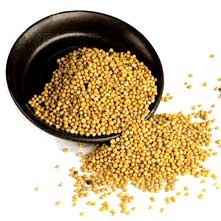
![]()
Arabic Name : Khardal Hindee
Bengali Name : Sarsapa
English Name : Mustard
French Name : Bredes moutarde
German Name : Indischer Senf, Ruten-Kohl, Ruten-Senf, Sarepta-Senf
Hindi Name : Sarson
Kannada Name : Sarshspa, Saasive
Latin name : Brassica juncea Coss.
Marathi Name : Mohari
Persian Name : Shershaf
Punjabi Name : Sarayo, Sarson
Sanskrit Name : Rajika, Sarsapa
Urdu Name : Sarson
Description : When taken internally, Mustard seeds are laxative, mainly because of the mucilage they produce, but only small doses are advised as they may inflame the stomach. In small doses it increases the appetite and stimulates the production of gastric juices. The stimulating, diaphoretic action can also be utilised for fevers, colds, and influenza.
This well known herb has its primary medicinal use as a stimulating external application. The rubefacient action of the oil causes a mild irritation to the skin, stimulating the circulation in that area, and relieving muscular and skeletal pain, like rheumatism, sciatica, backache, gout, leg cramps, headache, stiff neck, etc. and is useful in cellulite.
Mustard oil when instilled in the nose helps to thin mucus and make it easier for you to breathe when you have a sinus or nasal congestion.
Recommended Dosage : 3 to 6 g powder of dried seeds.
Contraindication : Large doses of Mustard seed (many times the recommended amount) should not be taken, especially by those with cardiovascular problems. Children under the age of six and the elderly should not use this herb. People with sensitive skin should never let undiluted oil come in contact with the skin, as it might cause blisters.

Leave a Reply
You must be logged in to post a comment.